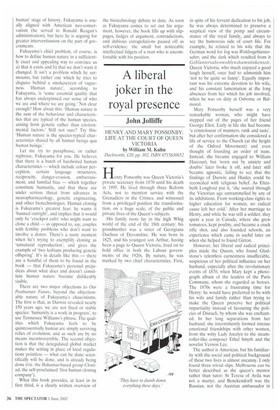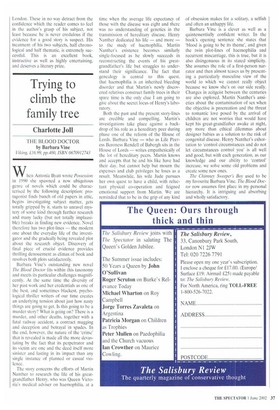A liberal joker in the royal presence
John Jolliffe
HENRY AND MARY PONSONBY: LIFE AT THE COURT OF QUEEN VICTORIA by William M. Kuhn Duckworth, ,f20, pp 302. ISBN 0715630652 Henry Ponsonby was Queen Victoria's private secretary from 1870 until his death in 1895. He lived through three Reform Acts, not to mention service with the Grenadiers in the Crimea, and witnessed from a privileged position the transformation, on a huge scale, of the public and private lives of the Queen's subjects.
His family roots lay in the high Whig world of the end of the 18th century: his grandmother was a sister of Georgiana Duchess of Devonshire. He was born in 1825, and his youngest son Arthur, having been a page to Queen Victoria, lived on to hold office in both the Labour governments of the 1920s. By nature, he was marked by two chief characteristics. First, in spite of his fervent dedication to his job, he was always determined to preserve a sceptical view of the pomp and circumstance of the royal family, and always to see the humorous side of court life. For example, he related to his wife that the German word for fog was Wohlengeblantersaber, and the dark which resulted from it Geblantersabenwohlenshamstinkenseit. Queen Victoria, who much enjoyed a good laugh herself, once had to admonish him 'not to be quite so funny'. Equally important was his extreme devotion to his wife, and his constant lamentation at the long absences from her which his job involved, when he was on duty at Osborne or Balmoral.
Mary Ponsonby herself was a very remarkable woman, who might have stepped out of the pages of her friend George Eliot. Early in life she had become 'a connoisseur of manners, rank and taste', but after her confirmation she considered a life of service to the Church (at the height of the Oxford Movement) and even thought of founding an order of nuns. Instead, she became engaged to William Harcourt, but 'worn out by anxiety and doubts' later broke it off, and later still became agnostic, failing to see that the findings of Darwin and Huxley could be reconciled with religious belief. As Elizabeth Longford put it, 'she soared through the Victorian age untrammelled by any of its inhibitions. From working-class rights to higher education for women, no radical cause left her cold.' After her marriage to Henry, and while he was still a soldier, they spent a year in Canada, where she grew tomatoes, kept poultry, and became a crack rifle shot, and also founded schools, an experience which came in useful later on when she helped to found Girton.
However, her liberal and radical principles made the Queen, who found Gladstone's relentless earnestness insufferable, suspicious of her political influence on her husband, especially after the revolutionary events of 1870, when Mary kept a photograph album of the leaders of the Paris Commune, whom she regarded as heroes. The 1870s were a frustrating time for Henry: he would have preferred to be with his wife and family rather than trying to make the Queen preserve her political impartiality instead of favouring the policies of Disraeli, by whom she was enchanted. In her long separations from her husband, she intermittently formed intense emotional friendships with other women, from the witty Lady Jocelyn to the steamroller-like composer Ethel Smyth and the novelist Vernon Lee.
The author is American, but his familiarity with the social and political background of these two lives is almost uncanny. I only found three trivial slips. Melbourne can be better described as the queen's mentor rather than tutor; St Teresa of Avila was not a martyr, and Benckendorff was the Russian, not the Austrian ambassador in
London. These in no way detract from the confidence which the reader comes to feel in the author's grasp of his subject, not least because he is never credulous if the evidence for a good story is suspect. His treatment of his two subjects, half chronological and half thematic, is extremely successful. This is an excellent book, instructive as well as highly entertaining, and deserves a literary prize.







































































 Previous page
Previous page